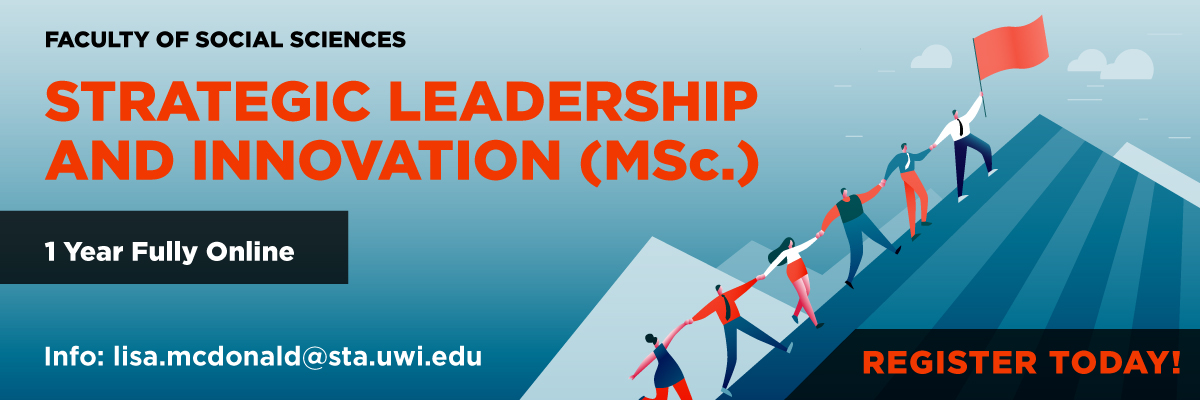MSc. Strategic Leadership and Innovation
Programme Overview
The M.Sc. Strategic Leadership and Management programme has been changed to the M.Sc. Strategic Leadership and Innovation programme.
It is not business as usual! Globalization, economic downturn, and now a pandemic that is having untold impact on businesses, governments, and even the way persons conduct their lives. There is need for change. There is need for innovation. There is need for people who can drive the required changes, while linking those said changes to strategy and strategic planning. As such, the M.Sc. in Strategic Leadership and Innovation has been specially crafted to:
- Create change agents who manage change in their sphere of influence
- Increase innovation in products, services, and processes in the Caribbean (where innovation is not strictly viewed as new to the world but new to the organization)
- Create thought leaders who can assess a situation, gather relevant information, conduct analysis and generate novel ideas.
Noteworthy Points
A programme that develops innovation, must itself be novel. There are a number of notable points about the M.Sc. in Strategic Leadership and Innovation:
- There are no examinations within the programme. The courses are assessed utilizing 100% coursework
- The candidate of this programme gets numerous practical elements as a great deal of the coursework entails utilizing the candidate's place of work or case studies for analysis and recommendations.
- The programme has a number of elements that are value-added to your career and can be added to your Resume
- Leadership Portfolio where you assess your own leadership skills, reflect on leadership material and develop a plan to enhance your own leadership capabilities
- Capstone looks at a problem/ opportunity in the workplace, use a number of business analytical tools, academic literature, and field work to provide business plans, action plans, policies, and recommendations. The Capstone is guided by a supervisor.
- Internship programme for candidates seeking a different experience.
Target Groups
- Senior Managers
- Manager
- Supervisors
- Individuals aspiring to leadership positions
- Entrepreneurs
who want to receive a suite of tools that enable them to improve their leadership skills, ability to assess a situation and capability to enable innovation.
M.Sc. Strategic Leadership and Innovation Partial Scholarship
The Faculty of Social Sciences, University of the West Indies is supplying two deserving students with a 50% tuition scholarship of TT$22,000.00.
In order to apply for the scholarship, email Lisa.McDonald@sta.uwi.edu by 11:59 pm on 16th August 2024 an Innovation Concept Paper.
The paper should include:
- Name of Innovation Project
- Name of Company/ NGO/ Ministry/ Industry
- Problem/ Opportunity
- Short Background
- Research Questions
The paper will be judged on:
- Title
- Novelty of the Idea
- Outcome / Value Creation
- Imitability
- Practicality
- Market Scope / Opportunity
- Proposal Clarity / Explanation
Admission Requirements
Admission to the programme will be open to persons who satisfy the following two sets of entry requirements.
Entry Requirements:
Admission to the programme will be open to persons who satisfy the following two sets of entry requirements
- Applicants should normally possess a Bachelor’s degree or equivalent from a University or College acceptable to the UWI. Such applicants should normally possess at least a Lower Second Class Honours degree.
- Applicants will be required to be successful at an interview to be conducted by a panel comprising at least three (3) members approved by the Dean, Faculty of Social Sciences. The applicants must be prepared to speak of an innovation idea they have for an organization or industry.
Delivery Mode
The programme will be taught fully online. Best practices on synchronous and asynchronous activities/ individual and group activities will ensure participant engagement.
Classes
Synchronous or live classes will usually be conducted during the week, commencing at 5:00 pm. Some classes may also be held on a Saturday.
Duration of Programme
The student has the option of being full-time or part-time student. As a full-time student, the programme can be completed in one-year and part-time in two-years.
 Programme Coordinator
Programme Coordinator
Ms.Lisa Mc Donald
E: lisa.mcdonald@sta.uwi.edu
T:662-2002 Ext. 83850
Programme Content
The M.Sc. SLIN can be taken as a full-time one-year programme, as per the below: OPTION1
|
Semester I: September to December |
||
|
Course Code |
Course |
No of Credits |
|
SLIN 6000 |
(Four off half-day workshops; held on Saturdays) |
1 |
|
SLIN 6001 |
4 |
|
|
SLIN 6002 |
4 |
|
|
SLIN 6006 |
4 |
|
|
Semester II: January to April/ May |
||
|
SLIN 6003 |
4 |
|
|
SLIN 6004 |
4 |
|
|
SLIN 6007 |
4 |
|
|
Summer: May to July |
||
|
SLIN 6005 |
4 |
|
|
SLIN 6008 |
3 |
|
|
SLIN 6009 |
8 |
|
Or the M.Sc. SLIN can be taken as a part-time two-year programme, as per the below: OPTION 2
|
Year 1 Semester I: September to December |
||
|
Course Code |
Course |
No of Credits |
|
SLIN 6000 |
(Four off half-day workshops; held on Saturdays) |
1 |
|
SLIN 6001 |
4 |
|
|
SLIN 6002 |
4 |
|
|
Year 1 Semester II: January to April/ May |
||
|
SLIN 6003 |
4 |
|
|
SLIN 6004 |
4 |
|
|
Year 1 Summer: May to July |
||
|
SLIN 6005 |
4 |
|
|
Year 2 Semester I: September to December |
||
|
SLIN 6006 |
4 |
|
|
Year 2 Semester II: January to April/ May |
||
|
SLIN 6007 |
|
4 |
|
SLIN 6008 |
3 |
|
|
Year 2 Summer: May to July |
||
|
SLIN 6009 |
8 |
|
Graduate Success Workshop
The purpose of the Graduate Success Workshop is to educate the postgraduate student about the M.Sc. Strategic Leadership and Innovation programme and provide strategies on how to succeed. Success at the master’s level requires a mindset of commitment, hard work and initiative. It requires advance writing skills. Clarifying the required mindset from the onset of the programme will encourage the appropriate attitudes. Further guidelines on writing will aid to develop these skills which will serve the candidate well in both their university and business life. Back to Table
Leadership
The Leadership course focuses on leadership and team effectiveness. It explores the classic and contemporary research and perspectives in leadership and teams. Students will be able to explore the science, the art, and the practice of leadership through their course materials by examining seminal readings, leadership approaches and apply leadership competencies in the literature. The course also focuses on students’ development of critical leadership and team effectiveness skills that will enrich their professional socialization and equip them with various competencies necessary for leaders and managers. Back toTable
Strategic Decision Making
The course, Strategic Decision Making, provides a comprehensive overview of strategic decision making in the context of decision making being one of the most critical skills for leaders. Further, because strategic decisions, as opposed to operational and tactical decisions, are characterised as being complex, and as having long-term consequences, this course emphasizes the tools and techniques that decision makers can employ to make quality decisions. The course focuses on the strategic decision making process, problem solving, decision making challenges, decision making tools and techniques, ethical decision making, and evaluation of quality in decision making. Back toTable
Customer Experience and Change Management
Customer Experience and Change Management course is designed to provide participants with the ability to assess, create, implement and evaluate Strategies related to customer experience management across all major sectors and cultures; leveraging Change Management theories, processes, tools and techniques for embedding a total customer experience philosophy and behaviours within the organization’s culture. It introduces students to the nature of organizational transformation via service experience culture, management and measurement. Back to Table
The Human Side of Innovation
The Human Side of Innovation examines how leaders can manage the human side of innovation using micro and macro perspectives. By so doing, students will be equipped to apply multiple skills and strategies required to navigate and transform organizational cultures to promote innovation. Students will be exposed to diverse learning modalities such as experiential learning, problem based approaches, case analyses, team work, corporate and public executive guest speakers and applied projects. The course explores effective strategic human resource management practices for innovation success using diverse approaches such as high performing work systems, team work and multifunctional teams, and other innovative strategies. It also examines the application of specific human resource management functions that build innovation capacity. It seeks to equip students with knowledge and practical skills to apply at the macro level of work environments that demand change, innovation, resilience, and competitiveness using scarce resources. Further, the course addresses the needs of leaders, who must manage the human side of innovation in an increasingly unpredictable, disruptive and complex environment in diverse work settings. Back toTable
Entrepreneurial Leadership
Entrepreneurial Leadership is a relevant and modern course that exposes participants to the theory of entrepreneurial leadership and will build competencies in adopting an entrepreneurial approach to solve organizational challenges. The students will also be exploring business model innovation as a means of implementing change in the areas of market share, technology and operations. Therefore, the entrepreneurial leadership skills developed will feed directly into organizational innovation and change.Back to Table
Research Methodology
The objective of this course is to provide students with the basic tools needed to conduct systematic research intended to solve business problems. It provides a general understanding of the design and execution of the scientific research process. The key topics include theory building, qualitative and quantitative research methods, the development and validation of measuring instruments, ethical concerns related to research, the internal and external validity of research data, and the effective communication and implementation of research results. Back toTable
Leading Innovation in the Digital Economy
This course is designed to provide the business leader with the perspective and frameworks needed to explore and integrate emerging technologies and exploit existing ones. The course will therefore cover a wide range of topics, including Dynamic Capabilities and Innovation, IS Strategy and Governance, Technology Architecture, Data, AI and Machine Learning, Business and Enterprise Systems, Social Commerce, Cybersecurity and Risk Management and Controls, and People, Culture, and IS-led Change Management. Back toTable
Leadership Portfolio
The Leadership Portfolio is an unsupervised project utilizing reading material from taught courses, additional appropriate readings, the Leadership Profile done in the Leadership course, and reflection to consider and inform the candidate’s leadership. The portfolio will enable self-reflection on past experiences of leadership and current skills and competencies. The student will analyze leadership theory, concepts, and guidelines and consider how to integrate them into their practice. The final product of the portfolio will be a three (3) year leadership development plan.
This course will be appropriate to any person working in or running an organization, who would like to improve their leadership skills and competencies. The portfolio can be used to assist in obtaining a job or promotion, or to inform a performance appraisal. Back toTable
Capstone
The Capstone is the instrument that is used to teach the student how to approach a problem or opportunity, specifically in innovation or a change process in an organization (profit or non-profit), industry or ministry. The student will arrive at solutions/ action plans/ policies/ recommendations based on academic literature, suitable methodologies to collect data, field work, and the analysis of primary and secondary data. The output of the capstone is a written project report. The capstone is guided by an appointed supervisor. Back to Table








